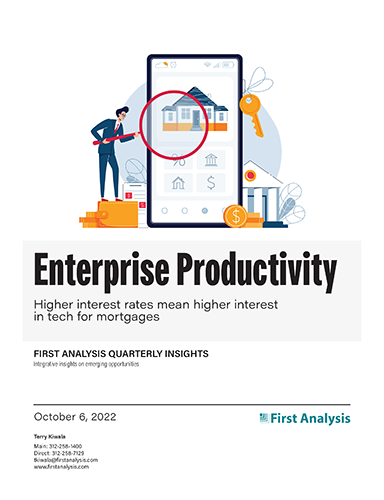Quarterly insights: Enterprise productivity
Higher interest rates mean higher interest in tech for mortgages

One might expect the recent rise in interest rates would be a negative event for companies selling technology to the mortgage industry, which has shed workers as refinancing demand has declined. We believe the opposite is true for several reasons.
Most importantly, as interest rates shift rapidly in the current, more volatile environment, it is more challenging than ever for now-downsized mortgage sector companies to respond quickly and efficiently to all their potential customers. Lenders have concluded technological innovation can make their mortgage volume capacity more independent of staffing levels. They also see opportunities to use technology to reduce overall loan origination costs and thereby provide flexibility to price more competitively.
These factors and others point to increased demand for technology that can automate and improve mortgage industry processes. We profile several innovative companies rising to the challenge.
TABLE OF CONTENTS
Includes discussion of nine private companies
- The counterintuitive implications of moderating loan volume
- Better tech means better customer satisfaction
- Regulators also want to see better mortgage industry tech
- Innovative technology solution providers rising to the challenge
- High-interest times for mortgage tech companies
- First Analysis Enterprise Productivity Index ends near one-year low
- Enterprise productivity M&A pace moderates
- Enterprise productivity private placement pace unchanged
The counterintuitive implications of moderating loan volume
The recent rise in interest rates has reduced demand for residential mortgage refinancing, housing and home purchase mortgages. Most of the drop-off in volume has been in refinancing demand. As seen in Table 1, the Mortgage Bankers Association refinance volume index has declined by nearly 80% since the start of the year, as many of those who hold mortgages of any substantial term or duration refinanced those loans in 2020 or 2021. The index shows a somewhat smaller decline over the same period (about 30%) for home purchase mortgages. One might expect this would be a negative event for companies selling technology to the mortgage industry. We believe the opposite is true for several reasons.

Request full report
To access the full report, please provide your contact information in the form below. Thank you for your interest in First Analysis research.
